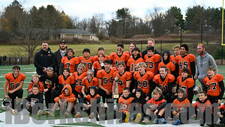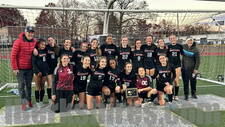Survey Shows What Employers Want12:00AM / Tuesday, January 30, 2007
North Adams - Those seeking Berkshire-based employment might better their chances of hire by demonstrating a positive attitude and a willingness to work and learn, according to a Workforce Development Needs survey conducted during the fall and completed by 288 regional companies.
The survey was launched as a collaboration of the Berkshire Compact for Higher Education, the Berkshire County Regional Employment Board Inc., the Berkshire Chamber of Commerce and the South Berkshire Chamber of Commerce.
BCREB Executive Director Heather Boulger today released a statement about the survey and its' results.
A Decade Makes A Difference
"Ten years ago, we found that employers were looking for industry-specific training, more computer-aided drafting, more computers, more math and science," Boulger said. "That is still the case but they were more specific toward that company. Now what we're finding is they're really looking for those personal and basic skills-people who can think on their feet, problem solve and work as a team."
Termed "soft skills," the list of desired employee attributes includes a work ethic, Boulger said.
"We want to educate this community [education and training providers] about what industries are looking for," Boulger said."The major point is that they're really [teachable] skills - soft skills - that anybody can learn."
The surveys were sent to a gamut of employers involved with multiple industries, from manufacturing to retail and health care to information technology.
"Basically, the companies were saying 'Give me an employee with a willingness and an ability to learn and we'll give them the industry-specific skills,'" Boulger said in the statement. "They're just looking for people that have those work ethic and attitude abilities."
Top Skills Needed Through 2012
The top areas identified by most survey respondents as being necessary over the next five years are: personal skills [self-management, attitude, communication, listening],interpersonal skills [customer service, teamwork, etiquette], basic skills [reading, math, writing, some English as a second language], resource abilities[supervisory, leadership, problem-solving, conflict resolution], information [managing time and money], technology [analyzing and interpreting data], and system [understanding an organization, health and safety].
Matching Needs To Training And Education
Massachusetts College of Liberal Arts president Mary K. Grant noted the value of the survey results. MCLA is part of the Berkshire Compact.
"This information connects nicely with the work of the Compact as we continue to improve access to education and training opportunities that support the needs of employers and employees," Grant said in a prepared statement."It is also an example of a heightened level of collaboration between the [regional employment board, area chambers of commerce, business and educators]. Working together, we have greater opportunities for success."
A Compact-established working group has partnered with the business community and is devising improved mechanisms to link employer needs with employee training providers.
The Berkshire Compact was formed two years ago to assess the higher education needs of Berkshire region residents.
Compact goals include improving access to education, training, and lifelong learning, raising the aspirations of Berkshire region residents to a 16-year education "norm," making the Berkshire region a competitive location for a technology and knowledge-based economy, and encouraging and promoting learning, earning, and civic engagement among employers, employees, and educational institutions. |


















